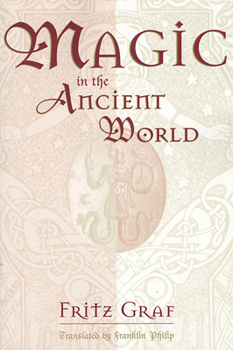Book Overview
Ancient Greeks and Romans often turned to magic to achieve personal goals. Magical rites were seen as a route for direct access to the gods, for material gains as well as spiritual satisfaction. In this fascinating survey of magical beliefs and practices from the sixth century B.C.E. through late antiquity, Fritz Graf sheds new light on ancient religion.
Format:Paperback
Language:English
ISBN:0674541537
ISBN13:9780674541535
Release Date:October 1999
Publisher:Harvard University Press
Length:320 Pages
Weight:0.85 lbs.
Dimensions:0.7" x 5.5" x 8.5"
Customer Reviews
2 ratings
Magic and religion are related......
Published by Thriftbooks.com User , 18 years ago
What is the difference between religion and magic? Fritz Graf says there is none. Graf a professor of Classics at Princeton University, has been described by his fellows as one of the world's most knowledgeable experts on Ancient Greek religion, and in this book he defends his title in reviewing the Presidendanz material-a collection of ancient texts (papyri) housed in Paris and developed during the Greco-Roman period. Graf also discusses artifacts from Attica and other areas in the Roman empire where thousands of binding tablets and `Voodoo' dolls have been discovered in recent years. Graf suggests the Presidendanz texts are as important for Greco-Roman religion as the Qumran scrolls for the Jewish religion, and the Nag-Hammadi texts for Gnosticism. Graf suggests that Frazier, being a good Hellenist (all scholars knew Greek and Latin in those days) got it wrong when he divided magic from religion (pursuit of spiritual knowledge). According to Frazier, while the former seeks to manipulate the Gods, the latter seeks to know their will. Graf says the ancient Greeks did both-using magical techniques such as creating `binding' tablets and using portents for divination. Graf divides the magic-religious practices associated with binding into two categories: 1/ binding" for the purpose of control and 2/ seeking to undo the binding or restrictions placed on a victim by a magician or sorcerer. Graf suggests the practice of exorcism practiced by Christians is an example of the latter kind of magic. Graf explores external influences affecting the Greco-Roman religion by examining linguistic terms associated with magical-religious practices, and he notes the connections between the words and practices of the early Christians and the `Pagan' Greeks. He suggests the term "magic" has Persian roots, and that both Christianity and the Greco-Roman religion were influenced by practices from the East. Because he reputedly could raise the dead and perform other `miracles' as could many Egyptian and Persian seers, Jesus was considered one of the magi.
A Fine Study
Published by Thriftbooks.com User , 24 years ago
This volume presents a good overview of the place of 'magic' in the Greek and Roman worlds. It should be interesting to modern practitioners as well as to students of history and culture.The book begins by examining the meaning of the term 'magic', especially as related to the term 'religion'. Beginning with the ways of the Magi, and its development through the 'mystery cults' and influences from Egypt, Persia and the Graeco-Egyptian papyri, the author traces the growth and change of the idea of magic in classical culture. The book then considers the figure of the magician, and the place of magical arts. It uses interesting classical sources, including a well-documented trial for sorcery of a Roman scholar. Two chapters address the rites if initiation of magicians, and the large body of evidence for the use of curse tablets and images.The book emphasizes magic as a personal and individual approach to the spiritual, and how that brought magicians under suspicion by religious authorities. It discusses the development of the literary image of the mage.I found the book to be satisfyingly scholarly, yet well written and engaging. The author shows a quiet humor that helps make this a very good book on a fascinating topic.Ian Corrigan Tredara@ncweb.com





